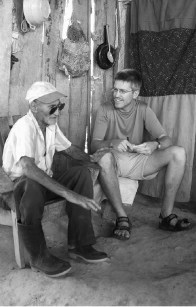John Fox, Ph.D. '94, has already had his biography researched and written. His role as a team anthropologist and director of research for an interactive Quest expedition to Australia drew the investigative eye and sharp pencil of a grade-school student in Toms River, New Jersey; she prepared Fox's portrait and biography for an exhibition in her school. Fox's voice still rings with astonishment as he describes the encounter with a drawing "which I could barely recognize as me" during one of his regular visits to participating schools. "My entire life, my influences and all, were pinned up on the wall," he recalls. "It was wild!"
 |
| John Fox talks with Don Paco, a village elder in El Remate, Guatemala. |
| ©2001/David McLain/Aurora/Classroom Connect |
The idea of Quests, and Fox's involvement with them, can be described in similar terms. The expeditions are organized by Classroom Connect, an on-line learning company, to give grade-school students across the United States the hands-on experience of trying to answer real archaeological questions. Students follow the expedition's progress on-line from their classrooms, reading daily reports and looking at photographs and video footage, and interact with scientific experts and members of the expedition team.
The first expedition, MayaQuest, was launched in 1995. Fox, who had specialized in Maya archaeology, was teaching at Boston University, but says he "didn't really see my future as being in academia." When Classroom Connect contacted him for advice, he volunteered to help establish connections with academia and organize expeditions. Two years later, he left his teaching position to work on Quests full time.
Classroom Connect now mounts two expeditions a year, and Fox is director of research. He is involved at every stage of the process, from seeking out "the coolest mysteries happening in science," to "tapping into the highest level of academic expertise," to figuring out logistics and going on expeditions himself, sharing his experiences with the on-line audience. Fox calls this an opportunity to "bring archaeology to the wider audience" and "inspire kids to think beyond the typical careers."
The Quests, he says, present a unique opportunity for young students to discover different cultures and peoples, learn about scientific process by interacting with experienced researchers, and contribute to solving some archaeological mysteries themselves. In the five weeks of following and directing the Quest team along China's Silk Road, trying to ascertain whether or not Marco Polo really visited the country, the on-line audience learned that the famous traveler never mentions the Great Wall or foot binding, did not notice the burgeoning silk and carpet trade in the towns he claimed to have passed, and, above all, did not merit even a footnote in the Chinese imperial chronicles, which assiduously documented every foreigner who entered the land. In the end, students decided that Marco Polo probably never visited China.
That student involvement give Fox more satisfaction than university research. "As an academic, I wrote articles that five or six other academics read," he says. "Now I write six pieces every week, which are read by 100,000 kids. Am I making more of an impact? I think I am."
~Diana Kudayarova





